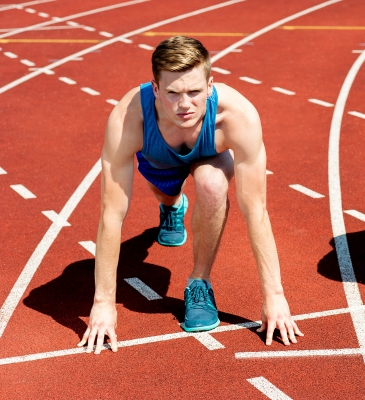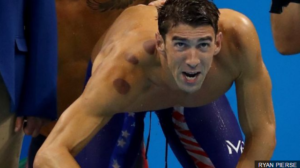

Why Are Olympians Covered in Circles?
The mark of the American athlete in the 2016 Rio Olympics is showing perfectly round bruises on their bodies. Gymnasts and swimmers are now using cupping strategies as a treatment for sore muscles, aches, and pains. The USA team has been sporting the mysterious marks as they compete in the Olympics games giving us curiosity in the treatment of musculoskeletal stiffness. These dots are not caused by any mischievous act by a 3,000-year-old procedure called cupping.
Athletes use cupping to relieve pain and stiffness for muscles after training long hours and performing in computations. The vigorous training on the body can take a toll over a long period of time. The Olympians find cupping to be relaxing and rejuvenating although scientific evidence has not proven the benefits of this ancient technique.
Olympians chose to use traditional Chinese healing techniques called cupping to relax sore muscles and increase blood flow to certain areas on their body. Cupping is an alternative therapy in which suction is created on the skin. Through suction, the skin is drawn into the cups by creating a vacuumed and placing the cups on targeted areas on the skin. The vacuumed can be created by either cooling or heating the air in the cup or via mechanical pump.
The cup is usually left on the skin for 5 to 15 minutes. It is believed that cupping can relive inflammation, muscular stiffness, treat pain deep scar tissues in the muscles and connective tissues, muscle knots and swelling; however, the efficiency of this is unproven.
Effectiveness in Cupping
It is difficult to determine the full effectiveness in the use of this alternative treatment for muscular relaxation and rejuvenation. Some have tried to use cupping to cure cancer and other medical diseases. The American Cancer Society notes that there is no scientific evidence that supports cupping for any health benefits and carries a small risk of burns and may cause unexpected pain Other disagrees and find this treatment relaxing and beneficial for treating muscular aches and pains.
Side Effects of Cupping unexpected pain
Using the cupping therapy is generally safe when done by a trained professional on healthy individuals. It is not recommended for those who have health concerns or to replace conventional treatments. Side effects can include burns, infection, bruising or pain.
Research suggests that cupping can be dangerous for people who are thin or overly obese. According to Jack Riso 1997 cupping results in capillary expansion, excessive fluid accumulation in tissues and rupture of blood vessels.
Ancient Chinese Cupping Therapies for Musculoskeletal Conditions
3,000 Year Old Ancient Treatment
This process dates back to the Egyptians, Chinese, and Middle Eastern Cultures and works by placing cups on the skin creating a suction along the meridians of the body releasing tension and increasing blood flow through tender muscles while stimulating energy flow.
Cupping has been performed by untrained individuals without any medical training for over 3,000 years. Traditional Persian Medicine in Iran uses wet cupping practices with the belief that cupping with scarification may eliminate scar tissue and cupping without scarification would cleans the body through the organs for toxin elimination. Individuals with a profound interest in the practice seek purification for religious reasons.
Cupping has gained publicity from the American Sports celebrities, National Football Player, De Marcus Ware and, Olympians Alexander Naddour, Natalie Coughlin and Michael Phelps. Medical doctor Brad Mckay wrote that the team USA was doing a great disservice to their fans who might follow their lead by using cupping as a treatment for muscular pain relief and discomfort. Calling cupping a useless traditional therapy. Practicing Surgeon David Gorski claims there is risks involved and no benefit from cupping and has no place in modern medicine and call this a celebrity fad. Others disagree and find cupping to be therapeutic for deep muscle relaxation and increased blood flow and oxygenation to targeted areas on the body. You decide.
Methods of Treatment
Broadly speaking there are three methods of cupping, dry cupping, traditional Chinese cupping and bleed cupping (controlled bleeding) wet cupping being used more commonly in alternative medicine. Neither method has verifiable health benefits. Preferences vary with practitioners and cultures.
Olympic athletes are shown with large circular marks on their bodies indicating cupping therapy is now being used as part of their muscular recovery and healing practice after training and competing.
The cups can come in various shapes of bells and balls and vary in sizes from 1 to 3 inches (25-76mm) across the opening. Plastic and glass are the most common materials used today replacing the horn, pottery, bamboo and bronze cups used in earlier times. The low pressure can be created by heating the air inside the cup with hot scented oils or flame and then placing it on the skin to create a suction effect. As the air cools it draws the skin in slightly inside the cup. Recently suction can be created with a mechanical suction pump action through a valve on top of the pump. Rubber cups are also available and can be used on uneven or bony surfaces on the body and are more easily adaptable.
In practice, the cups are used on soft tissue and can form a good seal with the surface of the cup. They may be used singly or use multiple cups to cover a larger area on the body. They may be used by themselves or placed over acupuncture needles. The skin can be dry or wet using oil that allows the cup to gently slide across the body without breaking the suction on the skin.
Depending on the treatment the skin markings are common after the cups are removed and should only last for a short period of time. This may be a simple red ring that disappears quickly. The discoloration is bruising caused by the suction from the cups and especially the movement from dragging the cups from one location to another in the treatment. As the cups gently slide across the skin during the process bruising can occur and is usually painless.

Fire Cupping
Fire Cupping involves soaking a cotton ball in 99% alcohol. Holding the cotton with forceps and then lighting the cotton on fire with a lighter. The cotton ball is placed inside of the glass cups heating up the air and the cups are sterically placed on the body creating a gentle suction. Using a lit cotton ball to heat the air inside of a glass cup and is placed on a specific area of the skin. The skin will contract to the suction procedure by gently lifting into the glass cup stimulating blood flow to that area.
Applying massage oil can lubricate the suction cups and allow the cups to gently glide over muscles in the cervical, trapezius erectors, latissimus, dorsal, lumbar, gluteus etc. In the act called moving cupping. Dark circles may appear where the cups are placed creating bruising from broken capillaries. Burns have been reported from this treatment and those who choose to practice fire cupping should be cautious.
This alternative treatment is used to release tension in the muscles and aid in healing. Olympians use this treatment for muscle repair and rejuvenation. Their sessions require long hours of repetitive motion, strength and resistance training causing muscular soreness and sometimes injury. Using the traditional cupping method can elevate pain and discomfort providing relaxation through deep muscle treat Traditional Chinese Medicine Cupping
According to traditional Chinese Medicine, cupping is used to create a vacuumed on the patient skin to dispel stagnation (stagnate blood and lymph) improving blood flow and lymphatic fluids in the body treating diseases such as bronchitis, colds, and pneumonia. Cupping is also used for lumbar, cervical, thoracic and other musculoskeletal conditions. Advocates say that cupping can be used for other treatments however caution is advised. Cupping should not be performed on the broken or infected skin, ulcers, and abdominal regions or on pregnant women. If you choose to try this controversial treatment on your own body use caution and select a professional who is well trained in the area of cupping.
According to Pacific College of Oriental Medicine, traditional Chinese medicine brings to mind, acupuncture and, the natural herbs and, healing remedies that include cupping therapy for healing. Cupping therapy is lesser know in modern civilization and has recently become a popular treatment for athletes and celebrities.Oriental medicine can provide a pleasant experience. One of the earliest documented cases of cupping can be found in the Handbook of Prescriptions for Emergencies written by Taoist herbalist by the name of Ge Hong which dates way back to 300 AD. Cupping has been used for centuries to treat conditions and muscular pain. Now Olympic athletes are trying this controversial treatment as part of their recovery and rejuvenation program.
Leave me a comment. Follow me on Facebook
Stay Well
Patricia Lynn
Images courtesy of StockImages at FreeDigitalPhotos.net
” If some one needs to be updated with latest technologies then he must visit this web site and be up to date everyday